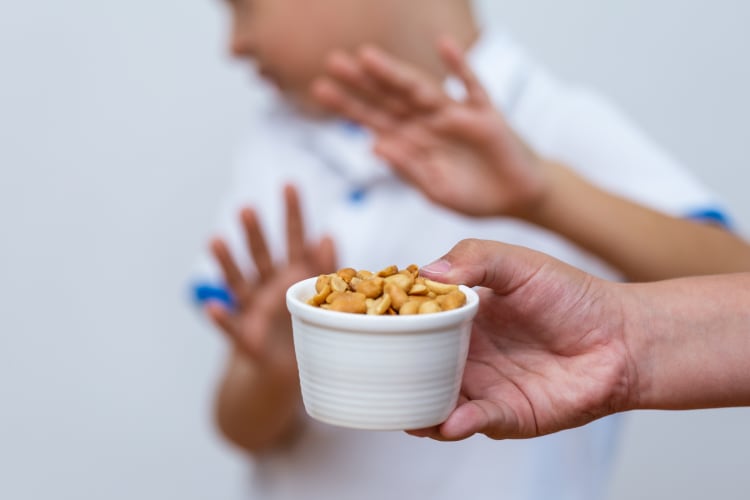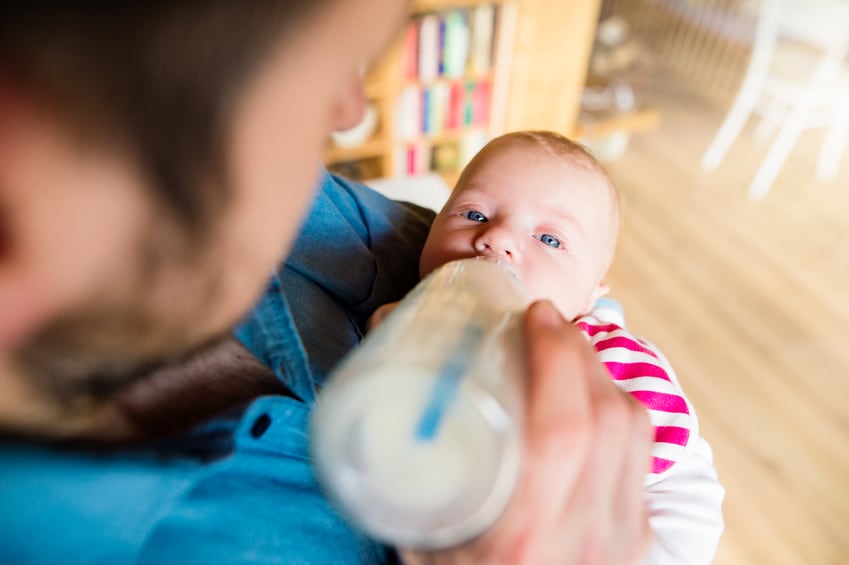Food allergies affect 6-8% of children, with eggs, milk and peanuts being the most common cause of problems. When exposed to an allergen, symptoms can include vomiting, cramps, hives, swelling, eczema, breathing problems and, in severe cases, anaphylactic shock. This can lead to hospitalisation or even death.
With so much at stake, more than 80% of parents face ‘significant worry’ about their child’s food allergy, a new study published yesterday revealed. Indeed, 42% of parents were found to meet the ‘clinical cut-off’ for post-traumatic stress symptoms (PTSS), while 39% reported ‘moderate to extremely severe anxiety’.
Parents whose children have had to have an adrenaline auto-injector (for example an Epipen) administered were seven times more likely to experience PTSS.
What causes PTSS in parents?
Judith Young, from UEA’s Norwich Medical School and Addenbrooke’s Hospital, noticed in her work as an Honorary Consultant Clinical Psychologist that parents were describing psychological distress related to their child’s allergy. But, to date, little research has focused on this issue.
This is where Dr Kate Roberts stepped in. She carried out the study as part of her doctoral thesis at UEA, in collaboration with Young, Dr Alex Brightwell from Norfolk and Norwich University Hospitals NHS Foundation Trust and Prof Richard Meiser-Stedman, from UEA’s Norwich Medical School.
“Caring for a child with a food allergy can be really challenging – not least because they can be exposed to the foods they are allergic to, even with very careful management,” Dr Roberts said.
“We wanted to see how the parents of children with food allergies were affected by anxiety, worry and PTSS. And we also evaluated whether the level of anxiety and stress experienced was linked to factors such as the severity of the child’s allergy.”
A total of 105 parents of children with medically diagnosed food allergies completed online questionnaires about their experiences. Around half of the children had been rushed to hospital at least once because of an allergic reaction.
The team considered the level of the child’s allergy alongside the parents’ intolerance of uncertainty – how they manage unforeseen events, like the fact that they cannot completely control their child’s exposure to food they’re allergic to. They also assessed the parents’ ‘self-efficacy’ – their confidence in allergy management.
Dr Roberts, who now works at Cambridgeshire Community Services NHS Trust and the Queen Elizabeth Hospital King’s Lynn, said: “We found that a large proportion of the parents – 81% - reported clinically significant worry and 42% reported significant trauma symptoms related to their child’s food allergy.”
The study found mixed results for a correlation between the severity of the child’s allergy and the parent’s likelihood to be affected by ‘clinically significant’ PTSS.
“Parents who reported their child to have had an adrenaline auto-injector (AAI) administered, were around seven times more likely to report clinically significant PTSS,” Dr Roberts explained. “But we found mixed results for the relationship between allergy severity and parent mental health, with PTSS observed in parents of children with both life-threatening and milder allergies.”
A clearer link could be drawn to anxiety levels and the parent’s own approach to uncertainty and self-efficacy, she continued. “Greater intolerance of uncertainty and lower food allergy self-efficacy were associated with poorer psychological outcomes.”
‘Greater awareness’ needed for mental health and allergies
Dr Roberts believes that increasing awareness of the mental health issues associated with allergens is important. “This really highlights the need for greater awareness about the mental health problems that parents of children with food allergies may be experiencing,” she said.
“Knowing which factors could predict different psychological outcomes is important because it could help identify those parents who may be struggling with their mental health and help them overcome some of the problems they may be experiencing.”
Dr Brightwell, Consultant Paediatrician, echoed the importance of adding to the ‘emerging body of evidence and ongoing research’ into the impact of food allergies on families.
“Anxiety and worry about having a child with food allergies is something we are seeing on a day-to-day basis. We are looking forward to working with UEA on further research to develop tools to support families affected by food allergy,” Dr Brightwell commented.
'Support services have failed to keep up'
Tanya Ednan-Laperouse and her husband Nadim set up the Natasha Allergy Research Foundation following the death of their daughter Natasha from a severe reaction to a food that she was allergic to. The charity focuses on raising education and awareness of food allergies and medical research.
Commenting on the research, the allergy campaigner said she is 'not surprised' at the scale of the mental health problems revealed in this report.
"Allergies have been rising at an alarming rate over recent years, while support services have failed to keep up with demand. Research shows in the 20 years to 2012, there was a 615% increase in hospital admissions in the UK for anaphylaxis," Ednan-Laperpuse told FoodNavigator.
"Many families tell us they are not given the care, support and information they need when their child receives a food allergy diagnosis. This leaves them with no hope and can be very stressful and frightening. This needs to change.
"When a parent sees a child having an anaphylactic reaction, they are watching their child dying and it is a terrifying experience, which leaves many living in fear."
Ednan-Laperouse agreed further research is needed to support people with food allergies and their families 'so they can lead as normal and stress-free lives as possible.’
The research was led by UEA in collaboration with Norfolk and Norwich University Hospitals NHS Foundation Trust.
Source
‘Parental Anxiety and Posttraumatic Stress Symptoms in Pediatric Food Allergy’
Journal of Pediatric Psychology
DOI: https://doi.org/10.1093/jpepsy/jsab012
Authors: Kate Roberts, Richard Meiser-Stedman, Alex Brightwell, Judith Young
FoodNavigator will spotlighting the issue of allergies and asking what innovation strategies can be employed in the free-from space to better serve this growing demographic at our 2021 digital summit, Positive Nutrition: Healthy Innovation for the Mass Market.
Register for FREE to hear from speakers including Tim McLachlan, CEO of the Natasha Allergy Research Foundation; Chris Hook, Free From Director at Warburtons; and Sophie Hieke, Head of Consumer Science at the European Food Information Council.
To get more details on this and the other topics we’ll be taking you through – from healthy ageing and childhood nutrition to wellness ingredients and reformulation – check out the full agenda.




